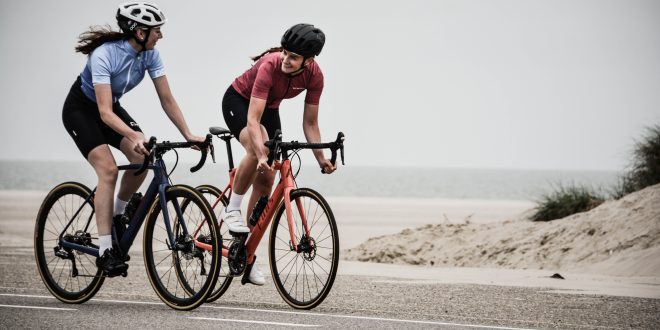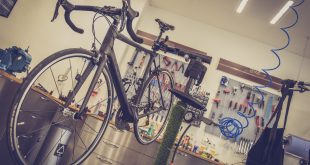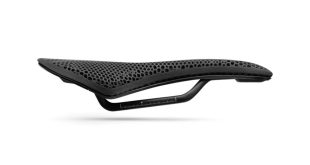Women in the bike industry still face challenges not experienced by male counterparts, but is the industry changing? Rebecca Bland explores the topic of equality in the trade
This piece first appeared in the March edition of BikeBiz magazine – get your free subscription here
If you head to a trade show or a bike launch, you might notice there are not that many women in the room with you.
Thanks to the handily timed Bicycle Association study on diversity in cycling, statistics show that women only make up 8% of the cycling industry’s workshop-based roles, 40% of administrative jobs and 19% of customer-facing roles.
Nine in 10 women that work in sports also report barriers to entering the industry, and 50% believe they are paid less than their male counterparts.
One could argue it is hard to attract women to an industry when only 11% of women cycle regularly, but that would assume every male in the industry is a regular cyclist, or at least has an interest in it.
So to understand the current state of affairs, I spoke to five women who work in different roles in the cycling industry
Progress has been made?
Amy Marks is head of marketing and PR at British wheel brand Parcours Velo.
She graduated from University College London with a master’s degree in Digital Media, Culture and Education in 2019, and went into a role with Canyon – where she says she was the only woman in the office.
Things got better during her tenure and more women joined the team, before her switch to the agency side of things with M&S Saatchi, where she covered a variety of sports and brands, including the Olympics.
Micromobility: Shifting to cargo bikes could save UK taxpayers £4 billion, according to new research
However, she felt her work-life balance didn’t allow for as much cycling as she wanted to do, so she applied to Parcours Velo when a job came up, and as it turned out, they were a majority female company.
“We are, I guess, probably in the minority within the cycling industry, that we are a majority female company,” explained Marks.
“We’re not a huge team; there’s three of us in the UK, and then we have our manager in China who’s also a woman. So we are a majority [female] company across China and in the UK, which is a pretty cool place to be. And despite being a small company, I think that it’s still a cool asset to have – something that I think in the office we’re all very proud of.”
Asked whether she thinks the industry has changed since she joined, Marks feels that progress has been made, particularly concerning the number of women joining the industry.
“When I started at Canyon, I was the only woman in the office,” continued Marks.
“That is something that they have worked on and are continuing to work on changing too. And you saw that even in the time that I was there. We were up to four of us by the time I left, so I think that that shows it was just something that needed time to progress.
“And I think that’s the main thing, people being aware of it and taking initiative with it. I feel like that is happening a lot more now, companies taking that initiative and taking an active step towards it rather than just kind of letting it be and not doing anything about it.”
Making the effort

Another workplace that’s been progressive in terms of its female staff is Singletrack, the digital and print magazine. It has always had a lot of women involved in significant roles, and is supportive of other aspects of equality as well. Hannah Dobson is their managing editor, a role she took on in 2021, after being editorial manager for six years, and she has noticed a shift in attitudes from when she first started in the industry.
“I think there’s more recognition that you need to make the effort”, said Dobson.
“I haven’t been on a press trip for a while now, but I’ve certainly had experiences of being the only woman on one and being the only person there out of all the staff on the launch as well as all the media people. There are some experiences of kind of sexist jokes and stuff being made that I think have been left more or less behind I think that really people are a little bit more conscious that this isn’t an all-boys club anymore.”
The all-boys club feeling may ring true for many women working in the cycling industry. There’s no denying that previously, cycling in one form or another has been seen as more of a male-dominated activity, and the repercussions of that remain when some feel like imposters.
“There is still that element there, it does still feel like you need to prove yourself, in a way that I don’t think the guys do,” continued Dobson.
“I think there is still that element of like presumption of novice-ness or that you won’t understand or whatever.
“I think it’s the recognition that it needs to change, but it hasn’t yet changed. The men that are in the roles that a woman could be doing too haven’t moved on. I was at iceBike, and there were very few women there. And there are women in the industry, but proportionately, you don’t see as many in things like technical roles. The shift is happening, but it has to work through the system.”
Companies like Parcours and Singletrack may be in the minority, although Issy Hobday, social media and content manager for Fully Charged is hopeful that the widespread growth of electric bikes means more women find cycling accessible: something that could transfer into more wanting to work in the cycling industry.
Tipping the balance
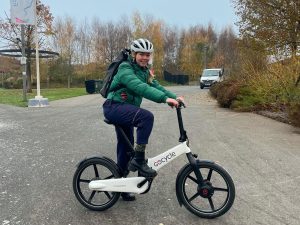
Hobday graduated from Bristol University last year and was club captain in her final year, but she admitted they struggle to retain female membership year after year. In her first job in the cycling industry, even though she works in a male-dominated team, she’s seen positive movements in the industry towards women – from the sporting and business sides.
“It’s been great to see across the industry things like Zwift sponsoring the first women’s Tour de France Femmes, and I think things are getting better. At Bristol, we used to have to work a little bit harder to try and attract new women. It used to go in waves. So when there were good numbers in the club, it would always attract more, but then as people left the numbers struggled.
“It’s different compared to a club. As a team, we work very well together and things are always heard and picked up on. It’s very harmonious, I never feel there’s much difference. Sometimes it’s just the little things that are different, so I often walk over to the building next door and have a coffee or a chat with one of my female colleagues. We’ll have ‘girl time’ as we call it, and I think that’s important. It’s important to have those things too.”
From the workshop
For some, however, the ability to connect with other women at work is non-existent, if you’re the only one in your workspace. A female bike mechanic in a bike shop in London who wished to remain anonymous described how there are no facilities for her, and both customers and fellow staff treat her differently based on her gender.
“There’s no separate bathroom, no sanitary bin,” she said.
“There’s none of that. You go into the shop and you have to be like a man and are treated like one of them. You do get a lot of sexism in this area, and I have a lot of people come in the shop and say, ‘Oh, I haven’t seen a bike mechanic woman before’.
“And it’s not even just the men. It’s the women. They go, ‘Oh, how do you enjoy it? That’s so good, you’re doing a really good job.’ It has got worse over time, to be honest. It’s hard. I enjoy my job, but it’s not easy and you have to be a strong character as a woman to go into an industry where it is very male-dominated.”
Alongside verbal discrimination, this bike mechanic has also experienced harassment, verbally and physically.
“I had an incident, where I was in the workshop, and this guy touched me on my ribs. I didn’t ask for it. I didn’t want him to, and I told him, ‘no, don’t do that.’ So I then made a formal complaint to my bosses to say, look, I was touched inappropriately. I raised a grievance towards him and I was told that I had to make adjustments to my shifts. So he had to work on different shifts from the ones I had to work, but I had to make the arrangements.
“I had another scenario where I was performing a bike fit, and this customer mentioned to me about my legs, saying how fit I was and stuff that I felt very uncomfortable with. And I felt like I couldn’t go and approach my colleagues about this because I look like I’m the one complaining.”
Women in the room
Customers treating women differently is perhaps not restricted to cycling, but when you’re running the event people are attending, you might think that would warrant some respect.
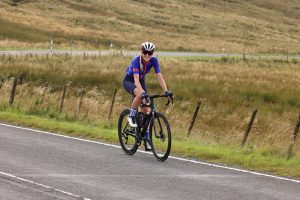
Instead, Zoë Westerman, events manager at Action Medical Research, revealed it’s often been the opposite when running sportives and events in the past in previous roles.
“It was a funny experience because even though I was running the event, if there was any man in any sort of authoritative position, people would ask them questions rather than me. The coach might signpost them and say, ‘You’ll have to ask Zoë because she’s running the event.’ And they’d sort of look and then turn back and start asking the coach more questions as if no, I can’t ask her, she can’t possibly know.”
“I think it almost pushed me to a point where in some of the earlier events I took a backseat then, so I ran the event but I wasn’t the face of the event at all because I thought maybe they’re more comfortable asking men questions. I think it pushed me into that position and made me feel less confident in answering questions, which is ridiculous in itself.”
She began her new role at Action Medical Research earlier this year and has joined an all-female events team. For Westerman, seeing women succeeding in the cycling industry is key to attracting more to join.
“One of the things that I love is just trying to make sure that women can see that women work in these fields. It’s tricky because obviously, you can’t be what you don’t see, but through the years I’ve been involved things have definitely changed and there have been steps forward although I think there’s still a whole way to go.”
So has the bike industry changed in favour of women in the last few years? Based on both my personal experience and the women I spoke to for this piece, perhaps it depends on the position you’re in. Those in media roles, including myself, seem to have been more fortunate than those in more customer-facing ones.
It seems daft to write, ‘fortunate’ to talk about feeling comfortable and safe in the workplace when really, it should be that way for everyone no matter their gender, age, or race. Granted, a bad overall experience from one person does not define an entire industry, but even one incident of sexism or even harassment should not be tolerated in this day and age.
To say the industry is still stuck in its old ways would be harsh. It’s evident that changes are being made, more women are being appointed to senior roles and there is more representation across the industry.
However, there is still a long way to go if we want to create an equal and safe environment for women to work in.
 BikeBiz Bicycle and cycling retail news
BikeBiz Bicycle and cycling retail news
